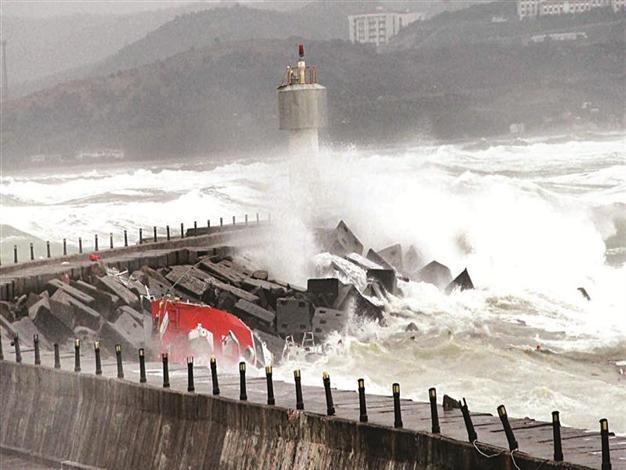All hell breaks loose in heaven
Belgin Akaltan, belgin.akaltan@hdn.com.tr

If basic security measures had been taken in Şile last week - such as life jackets, ropes and cordoning off the jetty - many lives could have been saved. DHA photo
Do you know Şile (pronounced “shee-le”)? It is a resort town, a beautiful settlement on the Black Sea coast, about 60 kilometers from Istanbul.
Somehow, for me, that place is heaven. I have been visiting Şile since I was a child, but it was much later on and by coincidence that my husband and I started camping there. Later, we bought an apartment and started spending all our free time and all our summers there for the next 20 years.
The place is so special for me that when I look back I can see it is the venue of my sweetest memories: where my son learned how to ride a bicycle (and where I also learned how to ride a bicycle as his mother - What? Can’t it happen? I never had a bicycle when I was a child), our favorite beach, our favorite breakfast place, the swings near the lighthouse where we pushed our child at two in the morning just because he wanted to, the tea-garden where the best tea in the town is served, the best platform to watch the sunset where we once came across Zuhal Olcay and Haluk Bilginer when they were still married…
I have given a lot of thought about what is so charming for me in Şile – Is it its closeness to Istanbul? The new road? The wonderful climate? The mild nature of its people? The culture of the town? The wonderful beaches? The sand? The relatively clean sea? our good memories there? Maybe it’s a combination of them all.
As I said, the place is a heaven for me and my family. I feel as if I know every corner, every rock in that small, discrete town.
Sadly, one of those heavenly corners of that beautiful town was the scene of a tragedy last week. During a heavy storm, at least four people died near the jetty when a rescue boat crashed onto the rocks and sank while trying to rescue the survivors of a cargo ship that also sank offshore. The captain of the rescue boat was last filmed clinging to the rocks, but was out of sight and out of life seconds later. The video footage is available on websites.
You can hear the amateur rescuers shouting “Quick, one of you get a rope!” (Halat getirin ulan biriniz!) Like black humor, these must have been the last voices the captain of the rescue boat heard. One fisherman also lost his life trying to save the captain. He slipped and fell to the sea.
It is so sad and ironic that the same rocks, the scene where we and many others have spent long hours, long days, enjoying the sun and the sea, was this time the cause of these tragic deaths.
This sea is known to be rough and unreliable. The history of Şile is full of sea disasters, and its rescue station is one of the oldest. How can an experienced rescue captain - a medal owner who has heroically saved dozens of lives before - die, along with most of his team, crashing his rescue boat on the rocks of the breakwater?
The biggest question is yet to come: Why, why, on earth, was the rescue team not wearing life jackets?
I mean, are those not the basics? Lifejackets in a rescue boat? Why were there people on the breakwater when the waves were so rough? Why did a TV cameraman injure his leg right there on the spot, slipping? The fisherman lost his life because he also slipped, trying to reach the captain. Why, why, on earth was there not a rope over there?
I’m not a sailor, I’m not a rescuer. I have an average intelligence (let’s just say so). I’m not even originally from Şile, but I know what to do when the sea is rough.
Just imagine: If only there was a rope, if only life jackets had been worn, and if only the police or the coastal guard, or the municipality, or the fishermen’s cooperative right there - any of them - had cordoned off the area; then there would have been at least four less deaths, one less broken leg.
Is this too sophisticated to think, to plan, to apply for average minds?
I bet it’s easier than spraying gas at protesters.
